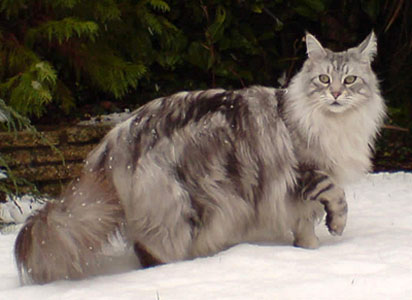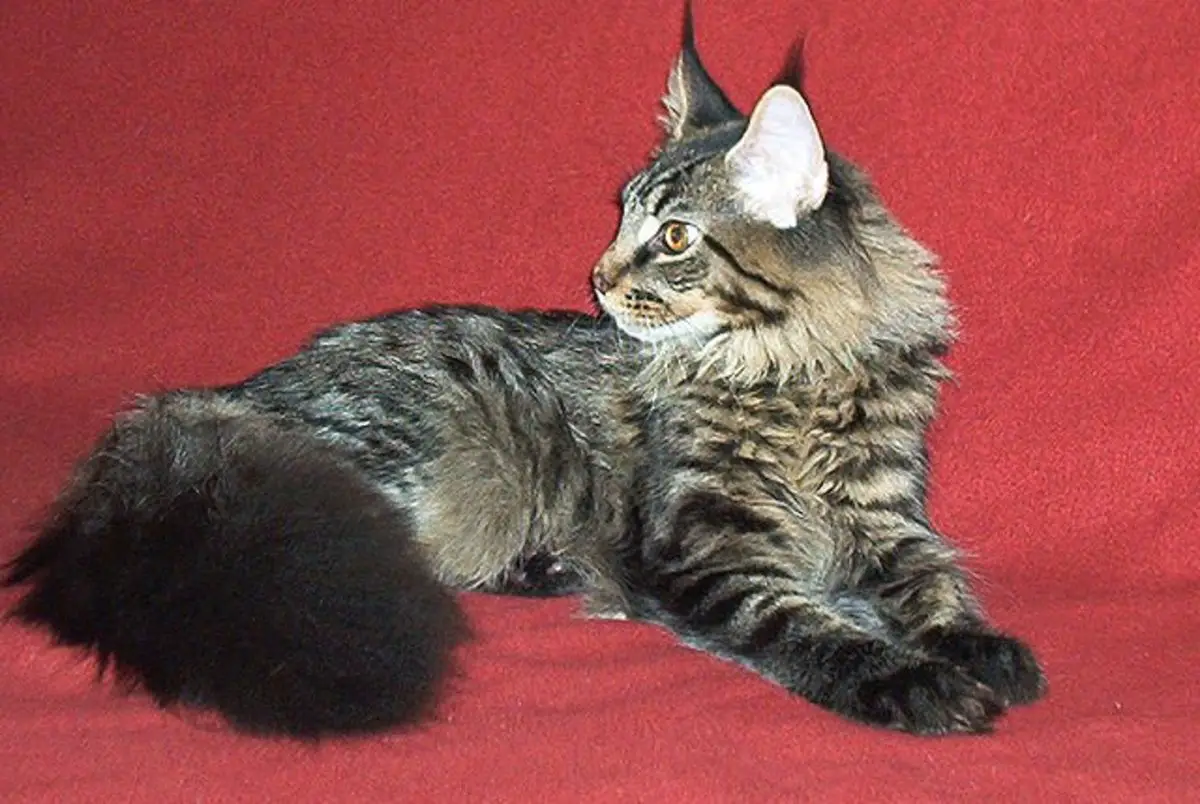Do Maine Coon Cats Have Any Health Issues? Find Out Now!
Maine Coon cats are prone to several health issues, including spinal muscular atrophy (SMA), hypertrophic cardiomyopathy (HCM), hip dysplasia, stomatitis, and polycystic kidney disease (PKD). They are also susceptible to bacterial and viral infections such as panleukopenia, calicivirus, rhinotracheitis, and rabies.
While they are generally considered a hardy breed, these hereditary health problems can occur in Maine Coons.
Common Health Issues In Maine Coon Cats
Maine Coon cats are known for their large size, beautiful coat, and friendly personalities. However, like all breeds, they are prone to certain health issues. It is important for Maine Coon owners to be aware of these common health problems in order to provide proper care and early intervention when needed. In this article, we will discuss several common health issues that affect Maine Coon cats.
Spinal Muscular Atrophy (sma)
Spinal Muscular Atrophy (SMA) is a hereditary condition that affects the muscles of the spine. This condition causes progressive weakening and wasting of the muscles, leading to difficulty in movement and coordination. Maine Coon cats with SMA may experience muscle tremors, weakness, abnormal posture, and physical instability. It’s crucial to work with a veterinarian to manage the symptoms and provide supportive care for cats with SMA.
Hypertrophic Cardiomyopathy (hcm)
Hypertrophic Cardiomyopathy (HCM) is a common heart disease that affects Maine Coon cats. This condition is characterized by the thickening of the heart muscles, which can potentially lead to heart failure or sudden cardiac death. Regular cardiac screenings and monitoring are essential for early detection and management of HCM in Maine Coon cats. Medications and lifestyle modifications may be recommended to help manage this condition and improve the quality of life for affected cats.
Hip Dysplasia
Hip Dysplasia is a condition that affects the hip joints of cats, causing instability and pain. Maine Coon cats can be prone to hip dysplasia due to their large size and skeletal structure. Symptoms of hip dysplasia may include lameness, difficulty in jumping or climbing stairs, and decreased activity level. Treatment options for hip dysplasia in Maine Coon cats may include pain management, weight management, physical therapy, and in severe cases, surgical intervention.
Stomatitis
Stomatitis is a common oral health issue seen in Maine Coon cats. It is characterized by severe inflammation of the gums and mouth, leading to pain, difficulty eating, drooling, and bad breath. The exact cause of stomatitis is not fully understood, but it is believed to have a complex immune-mediated component. Treatment for stomatitis may include dental cleanings, medication, and in some cases, extraction of affected teeth to alleviate pain and prevent further complications.
Polycystic Kidney Disease (pkd)
Polycystic Kidney Disease (PKD) is an inherited condition that affects the kidneys. It causes the formation of fluid-filled cysts in the kidneys, leading to progressive kidney damage and ultimately, renal failure. Maine Coon cats can be predisposed to PKD, and it is important to screen breeding cats for this condition to prevent its spread. Regular monitoring of kidney function through blood tests and ultrasounds is necessary for early detection and management of PKD in Maine Coon cats. Supportive care, such as a specialized diet and medications, may be recommended to slow the progression of the disease.
In conclusion, while Maine Coon cats are generally a robust breed, they can be prone to several common health issues. It is important for owners to be proactive in their cat’s healthcare, including regular veterinary check-ups, screenings, and implementing proper management strategies when needed. By staying informed and working closely with your veterinarian, you can ensure your Maine Coon cat leads a happy and healthy life.
Susceptibility To Infections
Maine Coon cats, like all felines, are susceptible to bacterial and viral infections that can compromise their health. It is important for cat owners to be aware of these potential infections and take preventive measures to keep their Maine Coons safe and healthy.
Bacterial And Viral Infections
Some of the common bacterial and viral infections that Maine Coon cats may be vulnerable to include:
Panleukopenia
Panleukopenia, also known as feline distemper, is a highly contagious viral infection that affects the immune system. It can cause symptoms such as fever, vomiting, diarrhea, and loss of appetite. Vaccinations are available to prevent this life-threatening infection.
Calicivirus
Calicivirus is a common respiratory infection among cats. It can cause symptoms like sneezing, nasal discharge, and ulcers in the mouth. Vaccinating your Maine Coon against calicivirus can help protect them from this infection.
Rhinotracheitis
Rhinotracheitis, also known as feline herpesvirus, is a highly contagious respiratory infection that can cause symptoms such as sneezing, coughing, and runny nose. Vaccinations are available to help prevent this infection.
Rabies
Rabies is a viral infection that affects the nervous system and is transmitted through the bite of an infected animal. It can be fatal if not properly treated. Vaccinating your Maine Coon against rabies is essential not only for their health but also for the safety of yourself and others.
By staying up-to-date with vaccinations and practicing good hygiene, such as regular handwashing and keeping your Maine Coon indoors, you can significantly reduce the risk of these infections in your feline companion. It is always advisable to consult with a veterinarian to ensure your Maine Coon’s health is well-maintained.
Lifespan Of Maine Coon Cats
Maine Coon cats are known for their long and healthy lives. Understanding the average lifespan of Maine Coon cats can help cat owners provide the best care for their beloved pets. It is important to note that each cat’s lifespan can vary depending on various factors such as genetics, diet, exercise, and overall health.
Understanding The Average Lifespan Of Maine Coon Cats
The average lifespan of a Maine Coon cat is typically between 12 to 15 years. However, with proper care and a healthy lifestyle, some Maine Coon cats have been known to live well into their late teens or even early twenties. It is crucial for cat owners to provide a nurturing environment that supports their cat’s physical and mental well-being.
Maine Coon cats are generally considered a healthy breed, but like any other breed, they may be prone to certain genetic health issues. Being aware of these common health concerns can help cat owners detect any potential problems early on and seek appropriate veterinary care. Regular check-ups with a trusted veterinarian can also contribute to early detection and prevention of any health issues.
Ensuring The Longevity Of Maine Coon Cats
To ensure a long and healthy life for your Maine Coon cat, it is important to prioritize their well-being through proper care and attention. Here are some essential steps to promote longevity:
- Provide a balanced and nutritious diet: A diet that is rich in high-quality protein, vitamins, and minerals is essential for the overall health of Maine Coon cats. Consult with a veterinarian to determine the best diet for your furry friend.
- Promote regular exercise: Maine Coon cats are known for their playful and active nature. Regular exercise helps maintain their physical health and mental stimulation. Provide plenty of toys and playtime to keep them engaged.
- Maintain a clean and stress-free environment: A clean living space is essential for the well-being of your Maine Coon cat. Regular cleaning of their litter box, providing fresh water, and creating a calm and stress-free environment can contribute to their overall health.
- Schedule regular veterinary check-ups: Regular visits to the veterinarian can help detect any potential health issues early on and ensure appropriate vaccinations and preventive care are administered.
- Keep an eye on their weight: Maine Coon cats have a tendency to become overweight, which can lead to various health problems. Monitor their weight and consult with a veterinarian if necessary to maintain a healthy weight through proper portion control.
By following these guidelines, you can ensure that your Maine Coon cat has the best chance of living a long, healthy, and fulfilling life. Remember, your cat’s health and happiness are in your hands, so make sure to provide them with the care they deserve.
Hereditary Health Complaints
Maine Coon cats are generally known for their robust health and long lifespan. However, like any other breed, they are susceptible to certain hereditary health complaints that owners should be aware of. These health issues can range from mild to severe, and it is important for cat owners to understand and monitor them to ensure the well-being of their beloved pets.
Hip Dysplasia
Hip dysplasia is a hereditary condition that affects the hip joints of Maine Coon cats. It is characterized by the abnormal development of the hips, leading to joint instability and potential pain. The genetic factors that contribute to hip dysplasia in Maine Coons are still being studied, but it is believed to be a polygenic trait, meaning multiple genes are involved. Cats with hip dysplasia may exhibit symptoms such as difficulty climbing stairs, jumping, or walking. If left untreated, hip dysplasia can lead to arthritis, lameness, and reduced mobility.
Spinal Muscular Atrophy (sma)
Spinal muscular atrophy is another hereditary condition that Maine Coon cats can be prone to. It is a degenerative muscle disease that affects the motor neurons responsible for muscle movement. Maine Coons with SMA may show signs of muscle weakness, tremors, and difficulty in coordination. The symptoms of SMA can vary in severity, ranging from mild muscle twitching to complete paralysis. Unfortunately, there is currently no cure for SMA, and affected cats may require supportive care to manage their condition.
Hypertrophic Cardiomyopathy (hcm)
Hypertrophic cardiomyopathy is a common type of heart disease that affects both humans and cats, including Maine Coons. It is an inherited condition characterized by the thickening of the heart muscles, which can lead to impaired heart function and potential complications. Maine Coons with HCM may show symptoms such as difficulty breathing, coughing, lethargy, and poor appetite. Regular veterinary check-ups, including echocardiograms, are crucial in detecting and monitoring HCM, as early intervention can help manage the condition and improve the cat’s quality of life.
As responsible cat owners, it is essential to be aware of these hereditary health complaints and take proactive measures to ensure the well-being of our Maine Coon companions. Regular veterinary check-ups, genetic testing, and proper care can help minimize the impact of these conditions on our feline friends.
Hardy Breed With Prone Health Issues
Maine Coon cats are known for their robust and resilient nature. As a hardy breed, they are generally healthy and can live long, fulfilling lives. However, like any other cat breed, they are prone to certain hereditary health issues that owners should be aware of and take precautionary measures to address.
Maine Coon Cats As A Hardy Breed Prone To Specific Hereditary Health Issues
Despite their hardiness, Maine Coon cats are not exempt from health problems. There are several specific hereditary health conditions that they may be prone to, including:
- Spinal Muscular Atrophy (SMA): A degenerative muscle condition that can cause muscle weakness and coordination issues.
- Hypertrophic Cardiomyopathy (HCM): A common type of heart disease in cats, which can lead to heart failure if left untreated.
- Hip Dysplasia: A condition where the hip joint is malformed, leading to discomfort and mobility issues.
- Stomatitis: An inflammatory condition affecting the oral cavity, causing painful ulcers and difficulty with eating and grooming.
- Polycystic Kidney Disease (PKD): A genetic disorder that causes cysts to form in the kidneys, potentially leading to renal failure.
It’s crucial for Maine Coon owners to be familiar with these health issues and to monitor their cats’ overall well-being by scheduling regular veterinary check-ups and seeking immediate attention for any concerning symptoms.
Ensuring The Well-being Of Maine Coon Cats
While some health issues may be genetically predisposed in Maine Coon cats, there are steps owners can take to reduce the risk or manage these conditions effectively. Here are a few essential measures:
- Veterinary Care: Regular visits to the veterinarian can help in early detection and treatment of any potential health problems.
- Genetic Testing: Breeders can provide valuable information about the parents’ health history and perform genetic testing to identify any potential health risks.
- Proper Nutrition: Feeding a balanced, high-quality diet can contribute to the overall health and well-being of Maine Coon cats, supporting their immune system and minimizing the impact of certain health issues.
- Weight Management: Maintaining a healthy weight can help prevent issues such as hip dysplasia and other joint-related problems.
- Environmental Considerations: Providing a safe and stimulating environment for your Maine Coon cat can promote exercise, mental stimulation, and overall well-being.
By being proactive and attentive to the specific health needs of Maine Coon cats, owners can take significant strides in ensuring a happy and healthy life for their feline companions.

Credit: www.ufaw.org.uk
Frequently Asked Questions On Do Maine Coon Cats Have Any Health Issues
What Illnesses Are Maine Coon Cats Prone To?
Maine Coon cats are prone to common hereditary health problems such as spinal muscular atrophy (SMA), hypertrophic cardiomyopathy (HCM), hip dysplasia, stomatitis, and polycystic kidney disease (PKD). They are also susceptible to bacterial and viral infections like panleukopenia, calicivirus, rhinotracheitis, and rabies, which can be prevented through vaccination.
Do Maine Coon Cats Get Sick Easily?
Maine Coon cats, like all cats, can get sick from bacterial and viral infections. They are also prone to some hereditary health issues such as spinal muscular atrophy (SMA), hypertrophic cardiomyopathy (HCM), hip dysplasia, stomatitis, and polycystic kidney disease (PKD).
Regular vaccinations can help prevent these illnesses.
What Is The Lifespan Of A Maine Coon Cat?
The lifespan of a Maine Coon cat is typically around 12-15 years. Maine Coons can have some hereditary health issues such as spinal muscular atrophy (SMA), hypertrophic cardiomyopathy (HCM), hip dysplasia, stomatitis, and polycystic kidney disease (PKD). However, with proper care, these cats can live a happy and healthy life.
Conclusion
Maine Coon cats, like any other breed, are not immune to health issues. They are prone to certain hereditary conditions such as spinal muscular atrophy (SMA), hypertrophic cardiomyopathy (HCM), hip dysplasia, stomatitis, and polycystic kidney disease (PKD). However, with proper care and regular veterinary check-ups, these health concerns can be managed effectively.
It’s important for Maine Coon owners to be aware of these potential issues and take necessary precautions to ensure the well-being of their feline companions. By remaining vigilant and proactive, you can provide your Maine Coon with a happy and healthy life.





